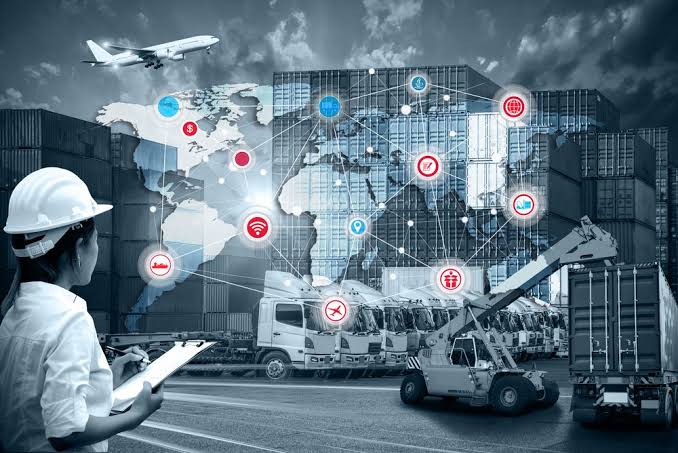Artificial Intelligence (AI) has become one of the most transformative forces in modern business, and logistics is among the industries experiencing significant advancements from its adoption. The logistics sector, which deals with the movement, storage, and distribution of goods, faces growing challenges such as increasing customer expectations, fluctuating demand, global supply chain disruptions, and rising operational costs. AI-driven technologies provide solutions that not only streamline operations but also increase efficiency, reduce costs, and improve overall service delivery. As the global supply chain becomes more complex, AI is no longer a luxury but a necessity for logistics providers seeking a competitive advantage.
Enhancing Supply Chain Visibility
One of the biggest challenges in logistics is limited visibility across the supply chain. AI helps overcome this by analyzing real-time data from multiple sources such as sensors, GPS devices, and IoT platforms. With these insights, companies can track shipments, monitor delays, and anticipate potential disruptions before they escalate.
Improved visibility ensures better communication between suppliers, manufacturers, and customers. This reduces uncertainty and allows businesses to proactively address bottlenecks. As a result, companies can deliver goods faster, build stronger client trust, and achieve more accurate demand forecasting.
Optimizing Route Planning and Fleet Management
Transportation remains one of the costliest aspects of logistics, and AI-powered route optimization significantly improves efficiency. Machine learning algorithms analyze variables such as traffic conditions, weather forecasts, fuel consumption, and delivery windows to determine the most efficient routes.
This optimization not only cuts fuel costs but also minimizes delivery delays. Additionally, AI systems support predictive maintenance for vehicles by analyzing performance data and detecting early signs of wear and tear. This reduces unexpected breakdowns, lowers repair expenses, and ensures fleets remain operational and safe.
Improving Demand Forecasting
Accurate demand forecasting is essential for inventory management and resource allocation. Traditional forecasting methods often fail to account for sudden market fluctuations, seasonal variations, or global disruptions. AI enhances forecasting accuracy by analyzing vast amounts of structured and unstructured data, including consumer trends, sales history, and even external factors such as economic conditions.
With precise forecasts, businesses can optimize stock levels, reduce storage costs, and minimize the risk of both shortages and overstocking. This leads to smoother supply chain operations and stronger alignment with customer demand.
Enhancing Warehouse Operations
AI-powered robotics and automation are transforming warehouse management. Automated guided vehicles (AGVs) and robotic arms powered by AI improve the speed and accuracy of picking, sorting, and packing goods. Computer vision systems also assist in inventory monitoring, reducing human errors and ensuring products are accurately tracked.
AI systems can also redesign warehouse layouts for maximum efficiency by analyzing how goods are stored and moved. This improves workflow and reduces time wasted in locating and transporting products within warehouses.
Strengthening Risk Management
Unpredictable events such as natural disasters, pandemics, or geopolitical conflicts can disrupt logistics operations. AI helps logistics companies anticipate risks by analyzing historical data, current events, and predictive models. This enables organizations to develop contingency plans and diversify supply sources.
By applying AI-powered simulations, companies can also test different scenarios to evaluate how potential risks could affect supply chains. This level of preparedness ensures more resilient logistics networks capable of adapting to sudden disruptions.
Personalizing Customer Experience
Modern consumers expect fast, reliable, and personalized services. AI enhances customer satisfaction by providing real-time delivery updates, automated responses to inquiries, and tailored recommendations based on purchase history.
Chatbots powered by natural language processing (NLP) handle customer queries efficiently, reducing the need for human intervention while maintaining service quality. This personalization builds loyalty and improves customer retention in an increasingly competitive logistics market.
Reducing Operational Costs
AI helps logistics companies identify inefficiencies and reduce unnecessary expenses. By optimizing fuel usage, labor allocation, warehouse space, and transportation schedules, AI drives significant cost savings.
Automation in repetitive tasks such as scheduling, invoicing, and order processing further reduces administrative burdens. As a result, logistics providers can operate leaner, cut costs, and redirect resources toward innovation and customer service improvements.
Driving Sustainability
Sustainability is becoming a key focus in logistics, as businesses seek to reduce carbon footprints and meet environmental regulations. AI supports green logistics by identifying energy-efficient routes, reducing empty miles in transportation, and minimizing fuel consumption.
Moreover, predictive analytics helps optimize packaging and reduce waste in warehouse operations. These efforts not only support environmental sustainability but also appeal to eco-conscious customers and investors.
Conclusion
The integration of Artificial Intelligence in logistics offers substantial benefits, from improved supply chain visibility and optimized fleet management to enhanced warehouse operations and customer experiences. By enabling predictive insights, automation, and risk management, AI helps logistics companies build resilience in an unpredictable global economy.
As customer expectations grow and global trade continues to expand, logistics providers that leverage AI will stand at the forefront of innovation, efficiency, and sustainability. Businesses that invest in AI today are not just optimizing their operations but are also preparing for the future of intelligent, adaptive, and environmentally responsible logistics.




This is impressively futuristic!
Good
Interesting
Impressive